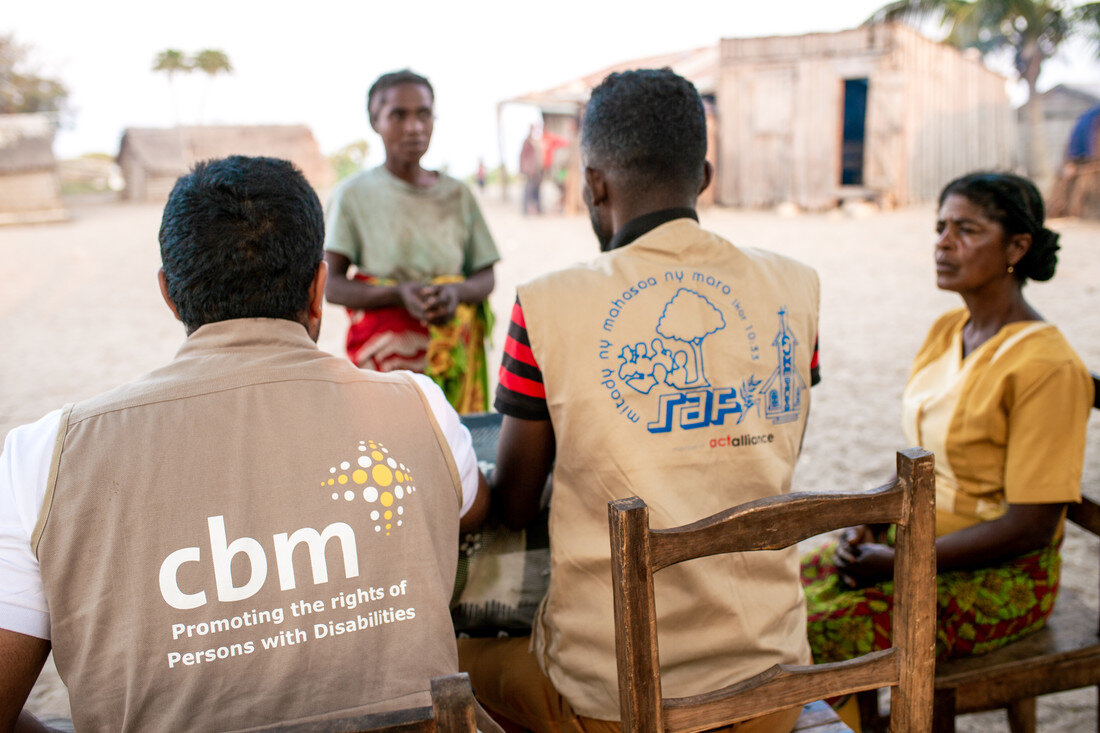Ireland Launch of the IASC Guidelines on Inclusion of Persons with Disabilities in Humanitarian Action
CBM and SAF FJKM deliver cash transfers to persons with disabilities in Ambaniza Commune, Berano city, Madagascar.
The Dochas Humanitarian Action Working Group and the IASC Disability Reference Group recently hosted the Irish launch of IASC guidelines on inclusions of persons with disabilities in humanitarian action on 3 June 2021. The IASC guidelines are the first humanitarian guidelines to be developed with and by persons with disabilities and their representative organisations together with traditional aid agencies. The launch marks the beginning of a new phase of Irish action to promote uptake, and implementation of the guidelines.
The webinar was moderated by Colm Byrne from Oxfam Ireland. In the introductory remarks Sarah O’Toole, the CEO of CBM Ireland, and Vice-Chair of Dochas signified the importance of new IASC guidelines, as an opportunity for humanitarian actors to deliver on their commitment to 'leave no one behind’. Frank Smyth head of the humanitarian unit of Irish Aid emphasised steps taken by the Department of Foreign Affairs in delivering those commitments through strengthening policy frameworks, joining Global Action on Disability (GLAD) Network, a stronger focus on disability across all programming, and funding for partners and others working specifically for persons with disabilities.
Kirstin Lange and Christian Modino Hok, co-chairs of the Global Reference Group on Inclusion of Persons with Disabilities introduced IASC guidelines and highlighted the practical ways to integrate the guidelines into programmatic approaches of a mainstream organisation. Zrinka Delic, CBM Ireland’s EU Project Manager presented the disability-inclusive EU-Consortium project “VIVID” to delineate how CBM Ireland with its partners provide technical assistance in Humanitarian response, ensuring valuable volunteering and engagement in the inclusion of persons with disabilities. Annie Slomann, Associate- Director for Oxfam in Timor-Leste, also presented the ways in which disability inclusion is being implemented in the field through close collaboration with Organisations of Persons with Disabilities(OPDs). In her words, “advocacy, investment in capacity building, working in partnership and resourcing DPO’s” can lead to a disability-inclusive humanitarian action.
The participants thereafter had an opportunity to discuss in groups the practical actions or steps to apply the guidelines in their organisations. The discussion reflected on the need for strategic and action-focused change, for truly mainstreaming disability-inclusive programs and also highlighted a better collaboration between Dochas members and working groups. After having insightful and enriching discussions the session was concluded with the closing remarks from Sarah “we always say the time is now, don't wait for perfection but act to bring some real action in this area”.
